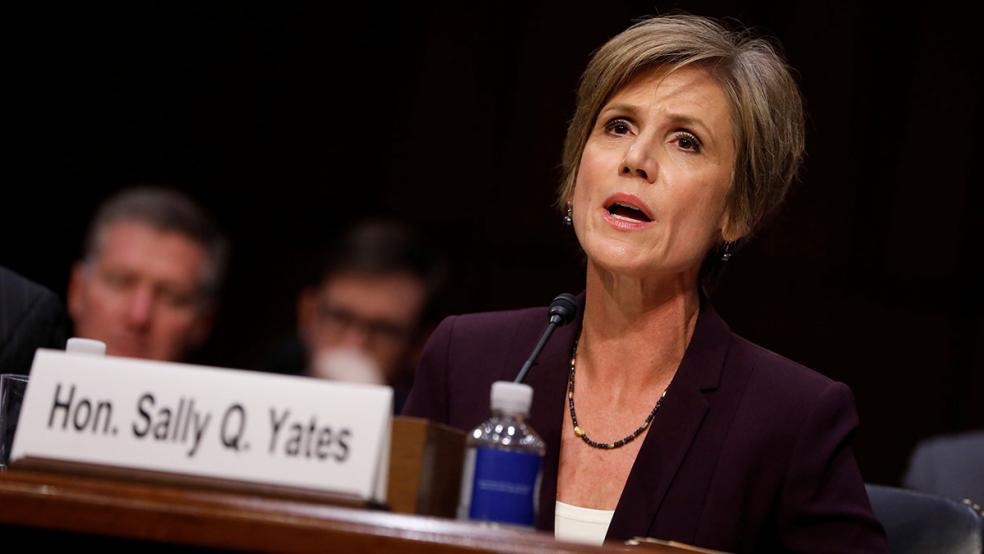The much-anticipated testimony of former acting Attorney General Sally Yates and former Director of National Intelligence James Clapper before the Senate Judiciary Committee revealed a huge gulf between the way Republican members of the committee are approaching an investigation into Russian interference in the 2016 presidential election.
“It was the Democratic Party of 2016 that were the victims,” said subcommittee Chairman Lindsey Graham (R-SC) at the outset of the hearing, trying to strike a bipartisan tone. “It could be the Republican Party in the future. When one party is attacked, all of us should feel an attack. There should be an Article 5 agreement between both major parties that when a foreign power interferes in our election, it doesn’t matter who they targeted, we’re all in the same boat.”
Related: Looks Like Flynn Is Manipulating Trump on Russia. Where’s His Pink Slip?
(Article 5 is the provision in the North Atlantic Treaty Organization charter that compels all signatories to come to the aid of another if it is attacked.)
Similarly, Nebraska Sen. Ben Sasse sought to steer the conversation toward a forward-looking investigation of how to prevent future interference with the elections and the federal government at large rather than allow the conversation to descend into what he described as “shirts versus skins” battles over the 2016 election.
But not all the GOP members of the panel felt the same way, with the two senators from Texas going out of their way to suggest that Yates, a 27-year career veteran of the Justice Department, was simply a partisan out to damage the Trump administration.
The hearing was the committee’s first opportunity to hear from Yates, a temporary holdover from the Obama administration who was fired by President Trump after she refused to allow Department of Justice attorneys to defend an executive order banning citizens of a number of majority-Muslim countries from coming to the US. It was that -- and other unrelated matters -- that consumed the attention of other Republicans on the panel.
Related: With Flynn Out, Trump Faces Pressing Questions About National Security
To the surprise of many, Sen. Ted Cruz began his questions not by asking about anything relevant to the topic of Russian interference in the election, but by dredging up the Hillary Clinton email scandal from 2015. He demanded that Clapper answers multiple questions about the former Democratic presidential nominee’s use of a private email server while she served as secretary of state, trying to get the former DNI to say that Clinton ought to have faced criminal charges.
When Cruz finally turned to Yates, he spent most of his allotted time criticizing her decision on the travel ban. Yates insisted that she had acted in good faith when she overruled an Office of Legal Counsel decision finding that, in at least limited cases, the executive order was lawful.
Cruz was unmoved, asking, “In the over 200 years of the Department of Justice history, are you aware of any instance in which the Department of Justice has formally approved the legality of a policy, and three days later the attorney general has directed the department not to follow that policy and to defy that policy?”
“I’m not,” Yates replied, “But I’m also not aware of a situation where the Office of Legal Counsel was advised not to tell the attorney general about it until after it was over.”
Related: Another Strike Against National Security Adviser Michael Flynn
The executive order was drafted in remarkable secrecy, with few people outside the inner circle of the White House aware of its contents, but Cruz said that perhaps Yates had not been advised of its contents because she was suspected of partisanship.
Cruz’s fellow Texan, John Cornyn, also berated Yates for her decision, complaining that she had “disappointed” him. Others stayed closer to the hearing’s stated topic -- Russian interference in the election.
It was Yates who, on January 26, requested a meeting with White House Counsel Don McGahn to inform him that retired Lt. General Michael Flynn, then serving as Trump’s National Security Adviser, had misled other members of the administration, including Vice President Mike Pence, about his contacts with the Russian ambassador. The FBI knew this because Flynn’s contact with the ambassador were uncovered as part of an ongoing investigation into Russian interference in the election.
Yates said that the FBI was aware of conduct by Flynn that she called “problematic in itself” but took action after it became clear to the leadership at DOJ that he was actively misleading others in the administration about his activities.
Related: Here’s the Real Puzzle About the Trump-Russia Connection
Flynn was allowed to remain in his position as National Security Adviser for 18 days after the White House was advised of his conduct, even though the Justice Department made it plain that they were concerned that he was subject to blackmail by Russian intelligence services.
The reason why Flynn’s conduct is of interest to the committee is because part of the investigation into what influence Russia had on the election is concerned with whether there was any collusion between associates of President Trump and Russian intelligence officials.
It was a topic Graham tried to dispense with immediately after questioning began, asking both witnesses whether they were aware of any evidence suggesting that Trump or members of his administration had colluded with Russia during the election campaign. Clapper said that he was not. Yates said that she could not answer that question without revealing classified information, but added that her refusal shouldn’t be taken as suggesting that the answer was “yes.”





